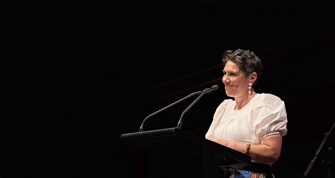Explore the program

Nardi Simpson is a Yuwaalaraay storyteller from NSW's northwest freshwater plains. Her most recent book is The Belburd. She has curated two events in the 2025 Festival Program which focus on bodies, song, rhythm and language as the material of storytelling and connecting.
Walk us through your curated events for the Festival and what inspired them.
I am always wanting to share the joy and complexity of first Nations art and cultural expression with everyone. Our mob are so incredibly talented and our creatives and their work and ways have inspired the events I have worked towards. Beyond the Self looks at First People’s continued conversations with the structures and knowledges that have physical effects on our bodily being. I am so excited to share the stage with Bebe Oliver, Thomas Mayo and Daniel Browning exploring and yarning this. And our deadly black women – what can I say? Songstress Poetica is a celebration of Blak women and women of colour, their words and rhythms and melodic artistry that oozes from them. With Kerry Moran, Afra Atiq, Jazz Money and Kirli Saunders.
What does the 2025 Festival theme In This Together mean to you?
I took this theme as an opportunity to connect in deep ways with my communities; my Blak sistahood, my First Peoples kin, my creative family and my artistic heroines, heroes and friends. After the rejection of an Indigenous Voice to Parliament I have decided to pour time, love and energy into those I am connected to. This curation is an extension of that movement for me.
How can books and reading bring people together?
Storying is a method of communication and exchange. When we engage deeply with story, we learn not just about ourselves but our connection to others and our place in the world. Sharing ideas in story form is an intimate, powerful practice.
What events, other than your own, are you excited to see at the Festival?
I’m a hanger-out-er-er. I can’t wait to see who books bring me into contact with. I’ll be wandering and loitering and listening deeply to most of the sessions for festival 2025!
Then, now, next. (What book you just read, what you’re currently reading and what you’ll read next.)
THEN: Indigenous Intellectuals: Sovereignty, Citizenship, and the American Imagination, 1880–1930 from Cambridge University Press, 2015
NOW: Sound Beginnings: The Early Record Industry in Australia by Ross Laird, Currency Press, 1999
NEXT: Eclipse by Kirli Saunders, Allen & Unwin, 2025
Is there a book you wish you could read for the first time again?
No. Each foundational work (for me) is ingrained with a set of memories and thoughts, places and experiences that bought the process of reading into vivid reality. I cherish each one of them and don’t want that experience to change.
What are your favourite reading spots?
I love the squashed desks tucked into the windows of level 8 at Fisher Library – University of Sydney.
Also wooden decks of Lightning Ridge houses as the sun is setting.
You first participated in the Festival in 2013. How has the Festival and your relationship with it changed over that time?
In 2013, I was the entertainment at the launch of the Festival Program. The gig was in the then Sydney Theatre (now named Roslyn Packer Theatre). We went on straight after a didj player and welcome, sang a song then left. I remember thinking at that time I would love to have a different connection to the event. I guess now I do!
Tell us about your new novel, The Belburd. How has it been writing and promoting a book this second time around?
I am incredibly proud of The Belburd, not just because it was a major creative work that I finished but because it claims a connection and kinship to a way of being creative. In the writing of the novel, I made creative choices about how best to exercise my connection to knowledge, country and people outside my own. The product is a work that, for me, leaves respectful space, alludes to other story, refers to others without interpreting their lives. I am proud of this approach and I am excited to speak about it with whoever will listen!
Other than writing novels, you’re also a musician. How does your musical practice influence your writing?
I used to want them to be different, separate practices. But now I love digging into the musicality of the written word and the lyricism of melody. Once I took my highfalutin ideas of deep artistic practice off the agenda I learned that my ear has as much to say in a story as my hand and brain do. Now I find music and writing are complimentary halves to a resonating, colourful whole.